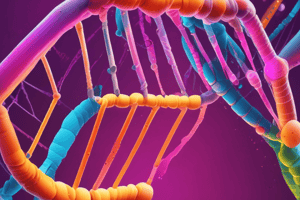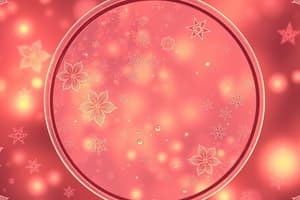Podcast
Questions and Answers
What is the primary function of agarose gel electrophoresis?
What is the primary function of agarose gel electrophoresis?
Which factor affects the migration speed of DNA in agarose gel?
Which factor affects the migration speed of DNA in agarose gel?
In which direction does DNA migrate during electrophoresis?
In which direction does DNA migrate during electrophoresis?
What is the relationship between DNA size and migration through an agarose gel?
What is the relationship between DNA size and migration through an agarose gel?
Signup and view all the answers
What is the effect of increasing the applied voltage during electrophoresis?
What is the effect of increasing the applied voltage during electrophoresis?
Signup and view all the answers
Which statement about DNA conformation and its effect on migration is correct?
Which statement about DNA conformation and its effect on migration is correct?
Signup and view all the answers
What happens to the resolution of DNA separation as the agarose concentration increases?
What happens to the resolution of DNA separation as the agarose concentration increases?
Signup and view all the answers
Which of the following describes gel electrophoresis compared to a method like SDS-PAGE?
Which of the following describes gel electrophoresis compared to a method like SDS-PAGE?
Signup and view all the answers
What is the purpose of mixing the sample with loading dye in agarose gel electrophoresis?
What is the purpose of mixing the sample with loading dye in agarose gel electrophoresis?
Signup and view all the answers
Which component is NOT mentioned as part of the agarose gel electrophoresis procedure?
Which component is NOT mentioned as part of the agarose gel electrophoresis procedure?
Signup and view all the answers
What structural feature differentiates RT-PCR products from PCR products when analyzing At-ACTIN?
What structural feature differentiates RT-PCR products from PCR products when analyzing At-ACTIN?
Signup and view all the answers
What is the purpose of visualizing agarose gel under UV light?
What is the purpose of visualizing agarose gel under UV light?
Signup and view all the answers
During PCR, what primarily determines the annealing temperature?
During PCR, what primarily determines the annealing temperature?
Signup and view all the answers
What concentration of agarose is used to prepare the gel according to the procedure?
What concentration of agarose is used to prepare the gel according to the procedure?
Signup and view all the answers
Agarose Gel Electrophoresis
Agarose Gel Electrophoresis
Signup and view all the answers
Agarose concentration
Agarose concentration
Signup and view all the answers
DNA conformation
DNA conformation
Signup and view all the answers
d. Applied voltage
d. Applied voltage
Signup and view all the answers
gel stains with what and look at under UV
gel stains with what and look at under UV
Signup and view all the answers
Study Notes
Lab 8: Nucleic Acids Separation by Agarose Gel Electrophoresis
- Lab course: BIOL 3120 Cell Biology
- Date: 10/28/2024
- Lecturer: Rubaia Tasmin, Master's Student
Today's Lab Overview
-
Agarose Gel Electrophoresis:
- Principle: Separates DNA fragments based on size in an agarose gel. Higher agarose concentration = smaller pore size.
- DNA migration: DNA moves from the negative (black) electrode to the positive (red) electrode. Smaller fragments move faster through the gel.
-
Factors affecting DNA migration:
- Agarose concentration: Inversely proportional to DNA mobility.
- Size of DNA molecule: Smaller molecules move faster.
- DNA conformation: Compact molecules (like plasmid DNA) move faster than linear fragments of the same size
- Applied voltage: Higher voltage = faster migration (within a 50-130 Volt range)
Procedures of Agarose Gel Electrophoresis
- Agarose gel preparation: 1g of agarose in 100mL TAE buffer.
- Sample preparation: Samples mixed with loading dye (bromophenol blue and sucrose for density).
- Gel polymerization: Agarose gel solidifies as it cools.
- Loading samples into wells: DNA samples added into wells in gel.
- Visualization under UV light: Gel visualized using SYBR gold stain.
Post-lab Questions
- RT-PCR Product size vs. Genomic PCR Product: Different sizes due to differences in the starting materials and potential intron/exon differences in the template sequence.
- PCR Annealing Temperature: Depends on primer sequence and the melting temperature of the primer pairs.
- PCR extension time: Determined by the length of DNA sequence targeted for the amplification, reaction components, and the buffer.
- Primers for sequence amplification: Sequence provided for primer design (page 11).
Studying That Suits You
Use AI to generate personalized quizzes and flashcards to suit your learning preferences.
Related Documents
Description
Explore the principles and procedures of Agarose Gel Electrophoresis in BIOL 3120 Cell Biology. This lab focuses on the separation of DNA fragments based on size and the factors influencing DNA migration. Enhance your understanding of this crucial technique with this informative quiz.




